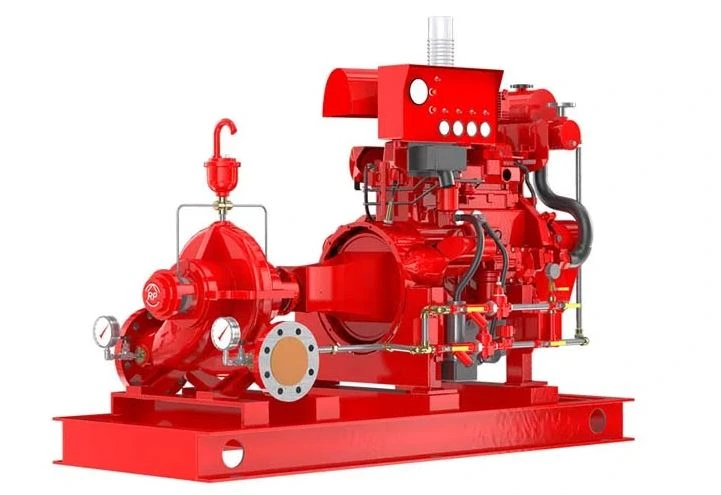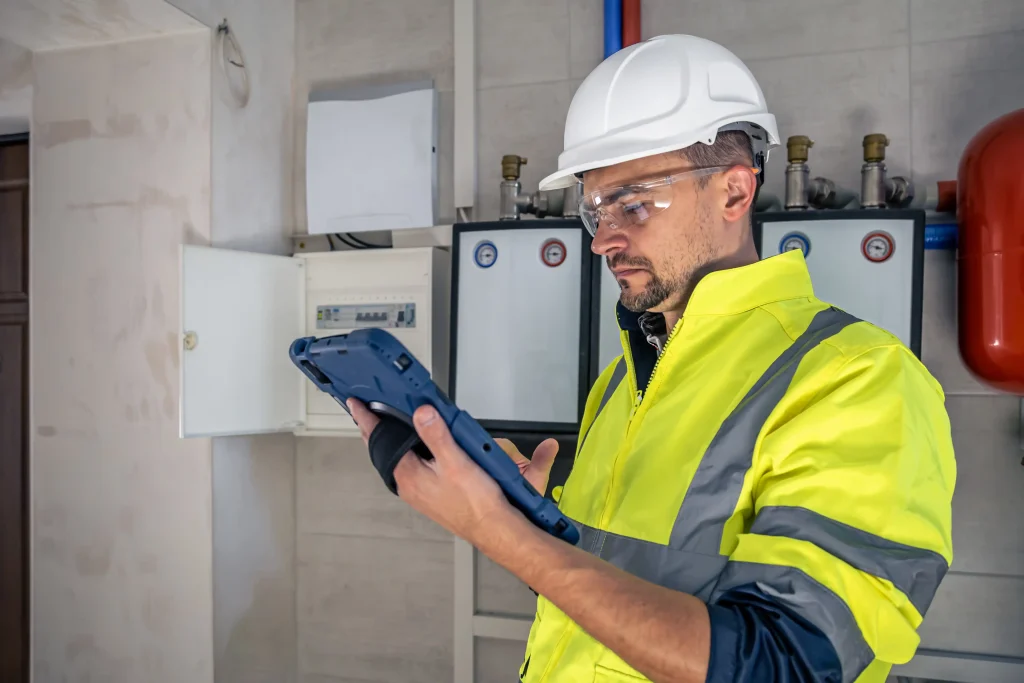Your diesel hydrant pump won’t start when used? This is most likely due to improper maintenance or even no maintenance at all, resulting in the engine failing to start.
In this article, we’ll explain common mistakes in diesel hydrant pump maintenance that should be avoided, as well as a brief guide that your internal team can follow in accordance with NFPA 25 standards.
The Vital Function of a Diesel Pump as the “Backup Life” of a Hydrant System

In a fire protection system, the fire hydrant system is a crucial element. To propel high-pressure water, hydrants require pumps, which typically consist of a main pump, a jockey pump, and a diesel pump.
The main pump is typically electric, offering a faster response in pushing water and fuel efficiency. As the name suggests, this pump acts as the primary pump to provide pressure to the water, while the jockey pump maintains stable water pressure.
Meanwhile, the diesel pump serves as a backup in the event of damage, malfunction, or even a power outage. Although its function is merely a “backup,” the diesel pump plays a crucial role in maintaining the water supply when the main pump is unable to operate.
Common Causes of Diesel Pump Failure During an Emergency
Given its crucial function, it’s important to maintain the performance of the diesel hydrant pump so it will always be ready to be used in an emergency. The following are causes of failure that occur due to poorly maintained pumps.
Weak or Damaged Battery
The first cause can be a damaged diesel battery. To avoid this, ensure you perform regular weekly maintenance by checking the condition of the terminals to ensure they are dry, clean, and securely fastened.
Don’t forget to check the remaining electrolyte level as well, and perform a visual inspection for corrosion, leaks, or other signs of damage. After that, test the battery’s performance by activating the pump during the maintenance process.
Fuel System Problems
The next problem could be an issue with the fuel system. In this section, two elements must be checked. The first is the fuel selection, which determines the engine’s lifespan. If properly maintained, the pump can last up to 15-20 years. However, if the quality is not checked regularly, it can shorten the engine’s lifespan.
Make sure you choose clean diesel fuel that is free from water to prevent sediment from forming in the tank and damaging its components. Also, be sure to check the fuel filter to separate the dirt carried by the fuel.
Automatic Controller Failure
The controller functions to trigger the diesel pump to automatically start when needed. If the diesel pump fails to start, a third possibility is a faulty controller system. To ensure controller performance, check the pressure switch and control panel, and make sure they work properly.
Weekly Inspection Guidelines for Internal Teams

Diesel hydrant pump maintenance can be performed by your in-house technicians if they follow the weekly no-flow inspection guidelines from NFPA 25. Here’s a weekly inspection checklist from the NFPA that you can perform:
- Turn on the diesel hydrant pump for 30 minutes.
- Begin a visual check for each component.
- Check the water pressure in the hydrant, make sure the water level is at least 6 bar.
- Check the fuel, make sure there is no buildup.
- Observe the engine’s revving time to reach running speed.
- Monitor the engine oil pressure gauge, speedometer, water level, and oil temperature indicators while the engine is running.
- Inspect the heat exchanger system for cooling.
- After each step is completed, record the results in an inspection logbook. You can use a specialized application that can monitor maintenance results, such as Firecek.
For a full guide, check this thorough weekly inspection by NFPA and pay attention to the diesel fire pump maintenance requirements.
In addition to weekly checks, your diesel hydrant pump should also be thoroughly inspected along with the rest of the hydrant system during an annual churn test.
During this process, a full simulation will be performed to ensure the system is operating according to standards. Therefore, this annual inspection is often performed by professional technicians because it involves:
- Control panel calibration
- Overhaul for a comprehensive inspection
- And other technical inspections
Why Should Annual Churn Testing Be Performed by Certified Professionals?
An annual inspection of your diesel hydrant system is one element of a fire protection system audit. It is important to have it performed by a professional to ensure the system complies with industry safety standards, such as NFPA.
Certified professionals possess proven technical expertise, meaning that they understand the parameters that must be measured. Therefore, these professionals can produce accurate analyses to prevent risks and system failures.
Most importantly, they understand how to document the results so your system complies with applicable regulations and standards. Failure to do so increases the risk of damage, compromises system security, and significantly increases the likelihood of failing an insurance audit.
Conclusion
Essentially, diesel hydrant pump maintenance is crucial to maintain the system’s performance even during power outages. You can do this yourself through your in-house technician team by conducting a short, 30-minute test weekly.
However, for long-term safety, you should also hire a professional technician to perform annual inspections. This ensures the diesel hydrant pump’s performance is maintained while complying with applicable safety standards.
Lumeshield has a team of certified professionals ready to assist with annual inspection of your fire protection system. Our team consists of experts with over 10 years of experience and professional certifications from BNSP, LPJK, and actively participates in international association workshops.
We utilize a data-driven approach to produce accurate analyses and recommend strategic steps tailored to your business needs. We also stay up-to-date with the latest safety standards, from SNI, FM Global, to NFPA, ensuring our inspection results comply with applicable standards.
By partnering with Lumeshield, we ensure the good performance of your hydrant pumps that can be used whenever the main pump is down. Contact us today for a precise annual churn test from the experts!

